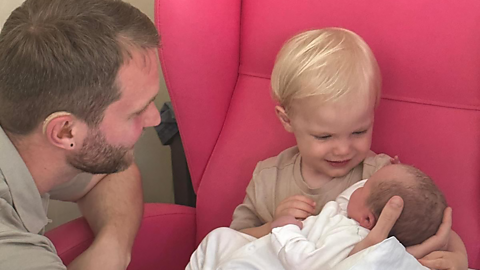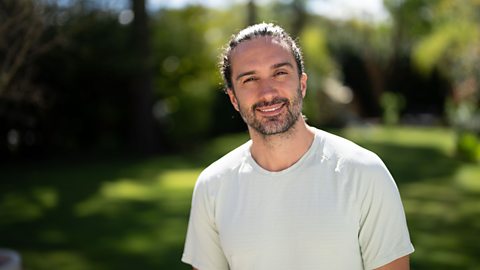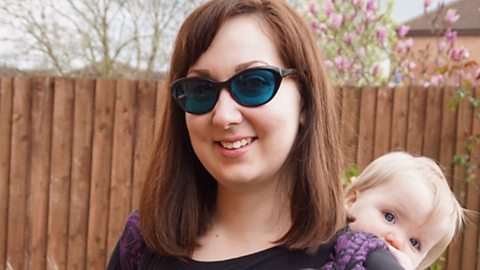Makaton is a language programme that uses signs, symbols, facial expressions and speech. It’s often used by those who have difficulties communicating verbally, including many under-fives.
For three-year-old Parker, who is pre-verbal and has Down’s syndrome, and his mum Leanne, Makaton has been an absolute ‘life-changer’.
Tiny Happy People spoke to Leanne from her home in South Wales to learn about life in the Constable family. From managing Parker’s Hirschsprung's disease, to learning Makaton and becoming an inspiration for other parents on social media…

Pregnancy – learning that Parker would have Down’s syndrome
Leanne had three teenage children in her life when she and her partner Steffan decided they wanted another baby. “I was so lucky to be pregnant again.”
“It wasn't until I was 16 weeks pregnant that the test came back that said there was a high chance that Parker had Down’s syndrome. They offered me the NIPT [Non-invasive prenatal testing] test and then that came back as a 99% chance.”
Discovering that Parker almost certainly had Down’s syndrome was a shock to Leanne, particularly as she had little practical knowledge of the condition. However, a little investigation soon put her mind at ease…
“I thought, what was life going to be like? It really scared me. But I soon learned that everything that I ever thought [about Down’s syndrome] was just so untrue. It was just all myths.”
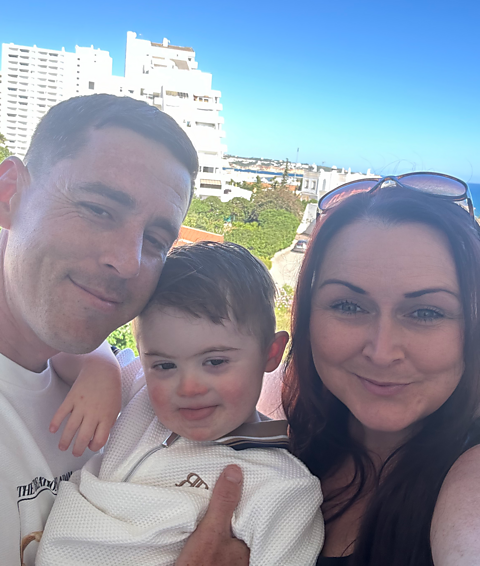
“I had an idea of a person with Down’s syndrome from when I was young, this would have been people with Down's syndrome born in the 60s. What I soon learnt is they were never given opportunities and were often institutionalised. Life for people with Down's syndrome is different now, things have changed dramatically - but it's far from perfect.”
Down’s syndrome often has an effect on the placenta, which can cause complications in pregnancy and childbirth – Parker was born early at 36 weeks, but initially, he seemed to be a perfectly healthy baby…
“When he was first born, he was doing amazingly. He didn't have any trouble breathing, he was taking his bottle. The doctors were saying, ‘Oh, you’ll be able to go home on Saturday’ and everyone's buying balloons.”
“And then 24 hours later it all started going downhill, bless him.”
“He wasn’t pooping, and then he stopped taking his feeds and became very unwell. We were rushed to the children's hospital in Cardiff and he was eventually diagnosed with Hirschsprung's disease as well.”

Hirschprung’s disease
Hirschprung’s disease is a condition that affects the bowels – nerves that would normally help in moving poo out of the body are missing from the end of the bowel and the poo gets stuck and builds up.
and, as such, Leanne had never heard of it.
“The first time when they first said it to me, I was like Hirsch-what?”
“That scared me more than the Down’s syndrome diagnosis. I was distraught. I was convinced that he wasn't going to make it.”
“But as soon as he got to Cardiff they knew what they were dealing with. Over the next few weeks, they made him well again and I was taught how to perform bowel washouts. Once I was confident, we were able to go home and get him bigger and stronger and at three months old, he had surgery.”
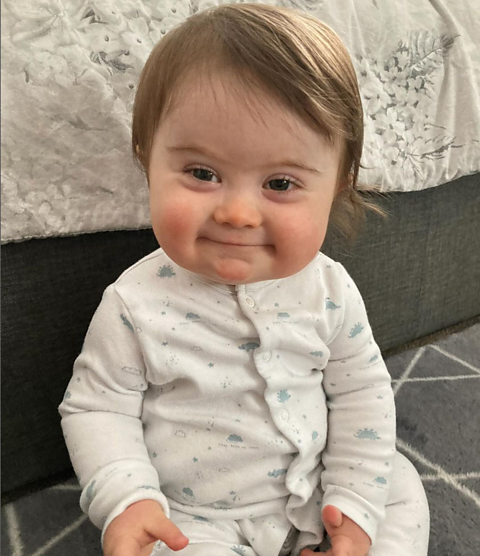
Surgery is necessary for those with Hirschprung’s disease – in this procedure, the affected section of the bowel is removed and the healthy sections are reattached.
“Some kids are great [after surgery] and they go on to have a normal healthy bowel. But unfortunately with Parker, it's not the case - we rely heavily upon medication and bowel washouts.”
“I can't leave Parker. I can't go on a night or weekend away without him. His bowels can cause him a lot of pain, so I always need to be close by to be able to help him”
Despite these challenges, Parker has grown up to become a ‘thriving’ three-year-old who loves nursery rhymes and building blocks. Leanne explains why he makes her so proud…
“From day one, his strength and determination to be here is just amazing. He has been through so much and he goes through so much every single day.”
“For some people, what Parker has to put up with would make them really miserable, but he's just so happy and so loving. He's just the most amazing little boy who loves singing, reading books and loves Mr Tumble.”

Makaton
Justin Fletcher, who has starred on CBeebies as Mr Tumble for over 20 years, is one of the most famous users and promoters of Makaton. His shows have brought the signs and practice of Makaton to a huge audience, many of them children with communication difficulties.
Parker, who is a big fan of Mr Tumble, is pre-verbal - although only recently he has begun to say the word ‘yeah’. Makaton is vital in his ability to communicate with his family.
“What I often do is give him a choice: ‘Do you want to play with the ball, or do you want to play with the blocks?’ He will sign what he wants to play with, if it's the ball or the blocks.”
“When we're looking at the books, I will sign the animals. For example, if there's a dog, we'll sign ‘dog’ and you can see him watching me do the signs and he's taking it all in.”
It took ‘a little while’ for Leanne to learn Makaton herself, but with lots of practice, the help of a local charity and, of course, Mr Tumble, she got to a point where she felt she could teach Parker.
“Admittedly I'll still watch Mr Tumble and watch for his signs so I can pick it up.”
All of her children have picked up a little Makaton, asking their Mum for a sign if they’re unsure. However, “Parker knows way more than them!”
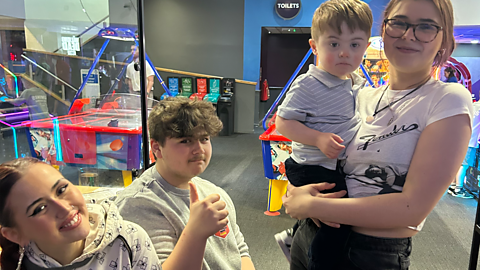
Who can use Makaton and other sign systems?
Makaton is used primarily by those with communication delay or difficulties, but Leanne feels that a much wider audience of parents, teachers and kids can find value in sign-supported communication systems.
“I think it should be used by all parents. Before babies can even verbally speak, they can pick up the signs. It’s just such an excellent way of communicating.”
“I believe it should be taught in all schools and nurseries. Since placing Parker into mainstream education, it has been difficult as none of the teachers know Makaton, which is a bit disappointing.”
“They've said they're going to try and go on the courses, but if they had those skills already, they could be encouraging Parker even more.”
“Makaton is not meant to replace [speech]. It's just a language aid, so you always continue to speak and you're always encouraging them to speak.”
You can learn more about Makaton at . Other sign-supported language systems used by both adults and children include .
What’s in the future for Parker?
Since joining mainstream education, Leanne has had to come to terms with being apart from Parker for the first time in his life.
“It has been really hard letting him go into the world by himself.”
“It has been a difficult transition and very stressful. He's not walking yet, so he's quite vulnerable. One of my biggest worries is if his bowels are causing him pain do others know how to read the signs? I can read him like a book.”
Choosing the right first school can be a huge source of anxiety for any parent – for Leanne there were extra considerations and the odd set back, before they finally found a fit…
“Some schools didn’t appear that keen to have Parker. It was really disheartening.”
“But when I went to the school that he's in now they were so welcoming. They were so positive I remember them telling me, ‘Oh, we’d love to have Parker and we can do this, or we can do that.’ They have been extremely accommodating.”
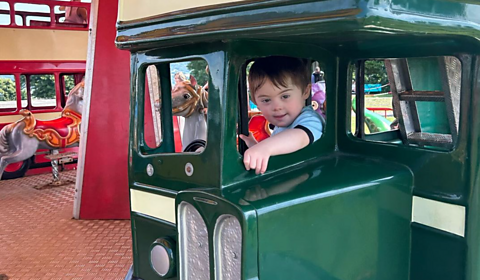
What does Leanne want for Parker’s future?
“I want to see him continue to thrive and become more confident. He's quite a shy boy. I just can't wait to see his character come out more in all settings - he is so funny and cheeky when he's at home. All I ever want is for Parker to be happy.”
“Whatever the future holds, whether it means he can recite poetry, or recite poetry in Makaton, it doesn't matter to me, he's amazing just the way he is.”
Life lessons from Parker
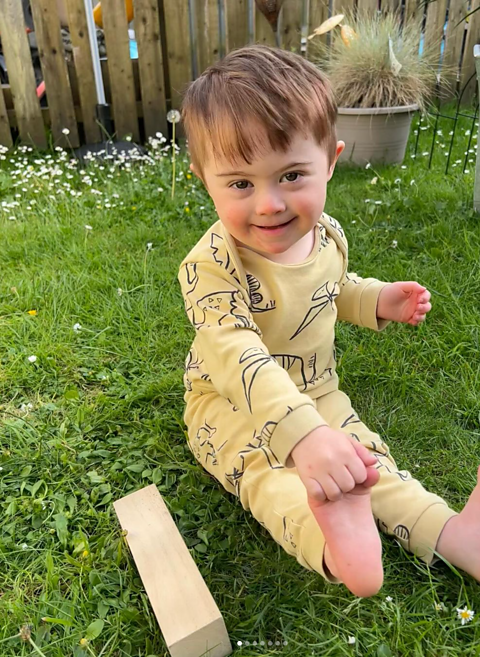
Leanne says that her and her family benefit from Parker's positivity every single day.
“We’re better people for having Parker in our lives. You see life for how beautiful it is - it's not about what you can achieve, whether you become a top lawyer or doctor, it's just about loving the beautiful things. And that's what Parker does. He just loves life.”
One lesson Parker has taught his mum is that you can never predict how your life is going to turn out.
“If somebody had told me four or five years ago: ‘You're going to have a child with Down’s syndrome and he's going to have thousands of followers on Instagram and he’s going to be modelling, I would have said, ‘Never in a million years!’
“Parker's Instagram account was started by his sisters and was originally just for family and friends. Then I thought, if we share Parker's journey we can potentially reach others who have just received a diagnosis of Down’s syndrome and show them the true reality and beauty of it.”


